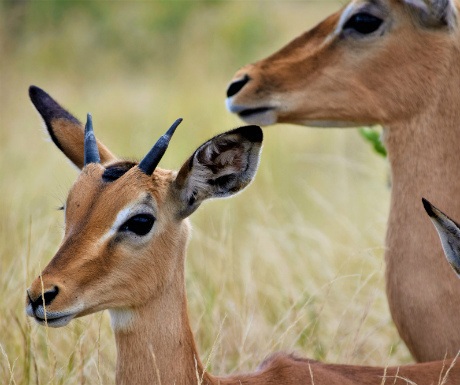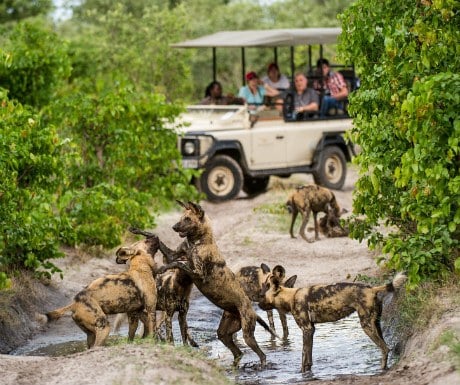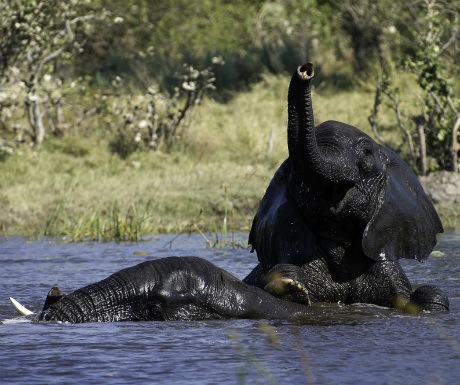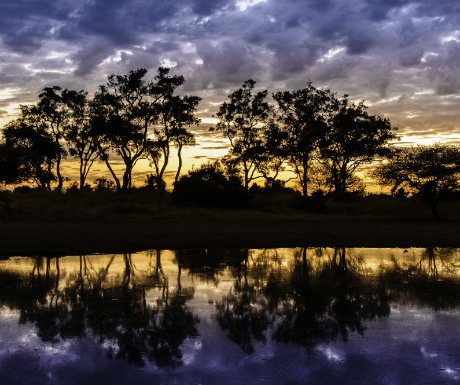Pula! 5 natural changes with the arrival of the rains in Botswana
The word ‘Pula’ must be the favourite word of the Batswana (the people of Botswana). It is so valued that it’s the name of their currency, the friendly expression used to convey ‘Cheers!’, and it translates literally as ‘rain’. In total, 80 per cent of the country is semi-arid Kalahari desert, and the start and length of the rainy season are by no means reliable – therefore, every shower or sprinkle is a blessing! It is a magical time of year when the long and extremely hot dry season comes to an end, so here are 5 wonderful changes to celebrate as the rain arrives:
Migration and new life
The rains can signal the migration and birth of many species. Animals no longer have to rely upon permanent bodies of water and are aided by the multitude of natural waterholes that fill up with the rain. They venture off into the fresh green horizon with confidence. Migratory birds paint the skies with different colours and unfamiliar shapes as they move in for the summer. Impala antelope are known for their synchronised breeding and births, seemingly well timed for after the rains have arrived and for their lambs to have the best chance of survival. The birth of all of these new animals of course provides lots of new food for predators. It is a great time to be in one of Botswana’s fine safari camps to witness this special time of the year.
 Transformation
As soon as the rains fall on the mopane and Kalahari apple leaf vegetation of the Chobe and Linyanti areas, there is a rapid transformation. One day it is dry, brown and desolate; the next it is bursting with a verdant green lifeforce. The contrast is unbelievable and quite a sight if you are lucky enough to be in either area at the right time.
Transformation
As soon as the rains fall on the mopane and Kalahari apple leaf vegetation of the Chobe and Linyanti areas, there is a rapid transformation. One day it is dry, brown and desolate; the next it is bursting with a verdant green lifeforce. The contrast is unbelievable and quite a sight if you are lucky enough to be in either area at the right time.
 Adventure
For many, the rains signal an adventure. The tracks can be flooded, making driving a bit trickier. On the Makgadikgadi pans, the cotton soil can be treacherous for even the best off-road vehicles. The safari guides in the region are experts at judging the conditions, and the activities on offer at many of the safari reserves are rarely affected. Thunder and lightning does add a wonderful atmosphere to an afternoon spent in this vast and wild part of the world, and the sounds of the African wilderness at night resonate that much better with the odd rumble of thunder.
Adventure
For many, the rains signal an adventure. The tracks can be flooded, making driving a bit trickier. On the Makgadikgadi pans, the cotton soil can be treacherous for even the best off-road vehicles. The safari guides in the region are experts at judging the conditions, and the activities on offer at many of the safari reserves are rarely affected. Thunder and lightning does add a wonderful atmosphere to an afternoon spent in this vast and wild part of the world, and the sounds of the African wilderness at night resonate that much better with the odd rumble of thunder.
 The end of ‘suicide month’
October in southern Africa is known as ‘suicide month’ due to the somewhat unbearable temperatures. When the rains arrive, normally in November, there is a marked decrease to a more bearable temperature, and this can be quite a relief for both animal and human residents.
The end of ‘suicide month’
October in southern Africa is known as ‘suicide month’ due to the somewhat unbearable temperatures. When the rains arrive, normally in November, there is a marked decrease to a more bearable temperature, and this can be quite a relief for both animal and human residents.
 Clouds
Clouds are a wonderful ingredient to a beautiful sunset. As beautiful as the fiery red, dry season sunsets can be, the variation of light as it is refracted through the clouds while the sun drops to the horizon is something to behold. It adds a whole new dimension to the scenery. Northern Botswana is a remarkable natural and geological area but it is quite flat, so great cumulonimbus clouds can appear like mountains in what is normally a huge empty blue sky.
Clouds
Clouds are a wonderful ingredient to a beautiful sunset. As beautiful as the fiery red, dry season sunsets can be, the variation of light as it is refracted through the clouds while the sun drops to the horizon is something to behold. It adds a whole new dimension to the scenery. Northern Botswana is a remarkable natural and geological area but it is quite flat, so great cumulonimbus clouds can appear like mountains in what is normally a huge empty blue sky.
 Julian Carter-Manning is a Co-founder and MD at Yellow Zebra Safaris.
If you would like to be a guest blogger on A Luxury Travel Blog in order to raise your profile, please contact us.
Julian Carter-Manning is a Co-founder and MD at Yellow Zebra Safaris.
If you would like to be a guest blogger on A Luxury Travel Blog in order to raise your profile, please contact us.
 Transformation
As soon as the rains fall on the mopane and Kalahari apple leaf vegetation of the Chobe and Linyanti areas, there is a rapid transformation. One day it is dry, brown and desolate; the next it is bursting with a verdant green lifeforce. The contrast is unbelievable and quite a sight if you are lucky enough to be in either area at the right time.
Transformation
As soon as the rains fall on the mopane and Kalahari apple leaf vegetation of the Chobe and Linyanti areas, there is a rapid transformation. One day it is dry, brown and desolate; the next it is bursting with a verdant green lifeforce. The contrast is unbelievable and quite a sight if you are lucky enough to be in either area at the right time.
 Adventure
For many, the rains signal an adventure. The tracks can be flooded, making driving a bit trickier. On the Makgadikgadi pans, the cotton soil can be treacherous for even the best off-road vehicles. The safari guides in the region are experts at judging the conditions, and the activities on offer at many of the safari reserves are rarely affected. Thunder and lightning does add a wonderful atmosphere to an afternoon spent in this vast and wild part of the world, and the sounds of the African wilderness at night resonate that much better with the odd rumble of thunder.
Adventure
For many, the rains signal an adventure. The tracks can be flooded, making driving a bit trickier. On the Makgadikgadi pans, the cotton soil can be treacherous for even the best off-road vehicles. The safari guides in the region are experts at judging the conditions, and the activities on offer at many of the safari reserves are rarely affected. Thunder and lightning does add a wonderful atmosphere to an afternoon spent in this vast and wild part of the world, and the sounds of the African wilderness at night resonate that much better with the odd rumble of thunder.
 The end of ‘suicide month’
October in southern Africa is known as ‘suicide month’ due to the somewhat unbearable temperatures. When the rains arrive, normally in November, there is a marked decrease to a more bearable temperature, and this can be quite a relief for both animal and human residents.
The end of ‘suicide month’
October in southern Africa is known as ‘suicide month’ due to the somewhat unbearable temperatures. When the rains arrive, normally in November, there is a marked decrease to a more bearable temperature, and this can be quite a relief for both animal and human residents.
 Clouds
Clouds are a wonderful ingredient to a beautiful sunset. As beautiful as the fiery red, dry season sunsets can be, the variation of light as it is refracted through the clouds while the sun drops to the horizon is something to behold. It adds a whole new dimension to the scenery. Northern Botswana is a remarkable natural and geological area but it is quite flat, so great cumulonimbus clouds can appear like mountains in what is normally a huge empty blue sky.
Clouds
Clouds are a wonderful ingredient to a beautiful sunset. As beautiful as the fiery red, dry season sunsets can be, the variation of light as it is refracted through the clouds while the sun drops to the horizon is something to behold. It adds a whole new dimension to the scenery. Northern Botswana is a remarkable natural and geological area but it is quite flat, so great cumulonimbus clouds can appear like mountains in what is normally a huge empty blue sky.
 Julian Carter-Manning is a Co-founder and MD at Yellow Zebra Safaris.
If you would like to be a guest blogger on A Luxury Travel Blog in order to raise your profile, please contact us.
Julian Carter-Manning is a Co-founder and MD at Yellow Zebra Safaris.
If you would like to be a guest blogger on A Luxury Travel Blog in order to raise your profile, please contact us.Did you enjoy this article?
Receive similar content direct to your inbox.


Wow I could not live there, I see rain as a blessing even in the UK, my plants surely appreciate it! Rain is such a wonderful thing for all creatures, I bet it’s lovely to see all of the animals enjoying it. October sounds like a terrible month to be there, I really do feel for them. What a beautiful and uplifting blog post, especially to read knowing that the ‘suicide month’ is over!
Wow such an interesting read, we get rain here in England all the time. Fascinating to see the changes when the rain arrives in Botswana.